The Irish-based Go Vegan World is the largest vegan education campaign worldwide. Its sophisticated advertising campaign has got under the skin of the animal exploitation industries, who have attempted, unsuccessfully, to shut it down. In this article founder Sandra Higgins explains the ethical considerations that animate her grassroots movement.
Most people imagine themselves to be animal lovers. Few scenes on television spark more awe than those featuring animals in their natural habitats, or more affection than those featuring companion animals in documentaries exploring their complexity and playfulness. We find ourselves moved when we witness the precariousness of their lives in TV veterinary series. If we witness one of them being chased or threatened, we find ourselves with bated breath until they escape.
From early childhood we are fair in our interactions with other animals. We don’t have an innate inclination to harm them. Most of us reach adulthood with the moral conviction that it is wrong to unnecessarily harm anyone, including other animals.
Yet despite considering ourselves animal lovers, most of us are responsible for the oppression and needless deaths of sentient, complex, individual lives, in the most brutal manner, with every non-vegan choice we make. What has led to this tragic farce where we can affectionately cuddle the family dog, whilst eating the remains of someone just like him, who lived a miserable life and endured a violent, painful and frightening death, for something we don’t need?
We grow up in a speciesist culture that discriminates against other animals on the basis that they are not human. But what occurs in exploitative industries is carefully hidden from us. We are progressively desensitised from our innate care for other lives into thinking that other animals don’t matter. We are educated in a system that teaches myth rather than fact. We erroneously believe that humans are superior to other species and that our difference from them entitles us to use them as objects to meet our needs. We are taught to separate their dead remains on our plates, in our clothing, in our personal care and cleaning products, and in our entertainment, from who they are.
If we are to face the fact that, although they are different to us, they share our right not to be used, harmed or killed, on the basis that we all have in common a sentient capacity to feel, be aware and value life, then we must reconnect with them. We must stop believing the lies that we are sold that we are better than them, that they exist for our use, and that our use of them is necessary.
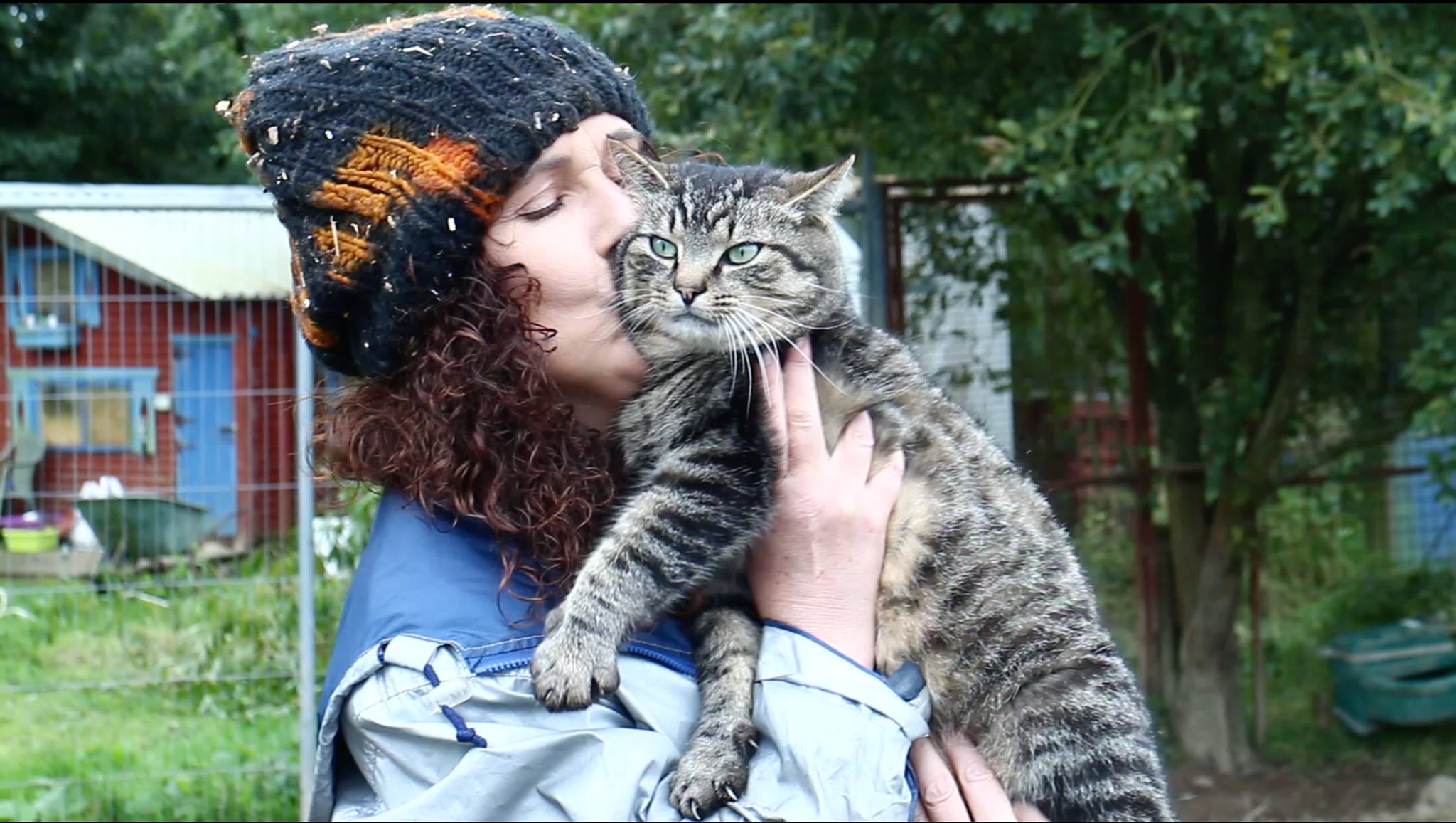
Educating the public so that we rid ourselves of these speciesist ideas and reconnect with the animals we use, is the goal of Go Vegan World, which is a public educational campaign that originated in Ireland in November 2015, and now operates internationally. It provides factual information that is our right to know and our responsibility to act on.
The public face of the campaign are advertisements positioned in places frequented by consumers: bus stops, tube stations, taxis, outside supermarkets and restaurants; public bathrooms; on social media; at sporting events; in newspapers etc. These direct the public to a comprehensive website and free Vegan Guide, which provides evidence-based information for people to learn why veganism is imperative if we are to be consistent with the non-violent values we claim to hold, as well as practical help on how to live as a vegan. The campaign also involves lectures, print, radio and television interviews, and works individually and with groups of people as they go vegan and learn how to be effective animal rights activists.
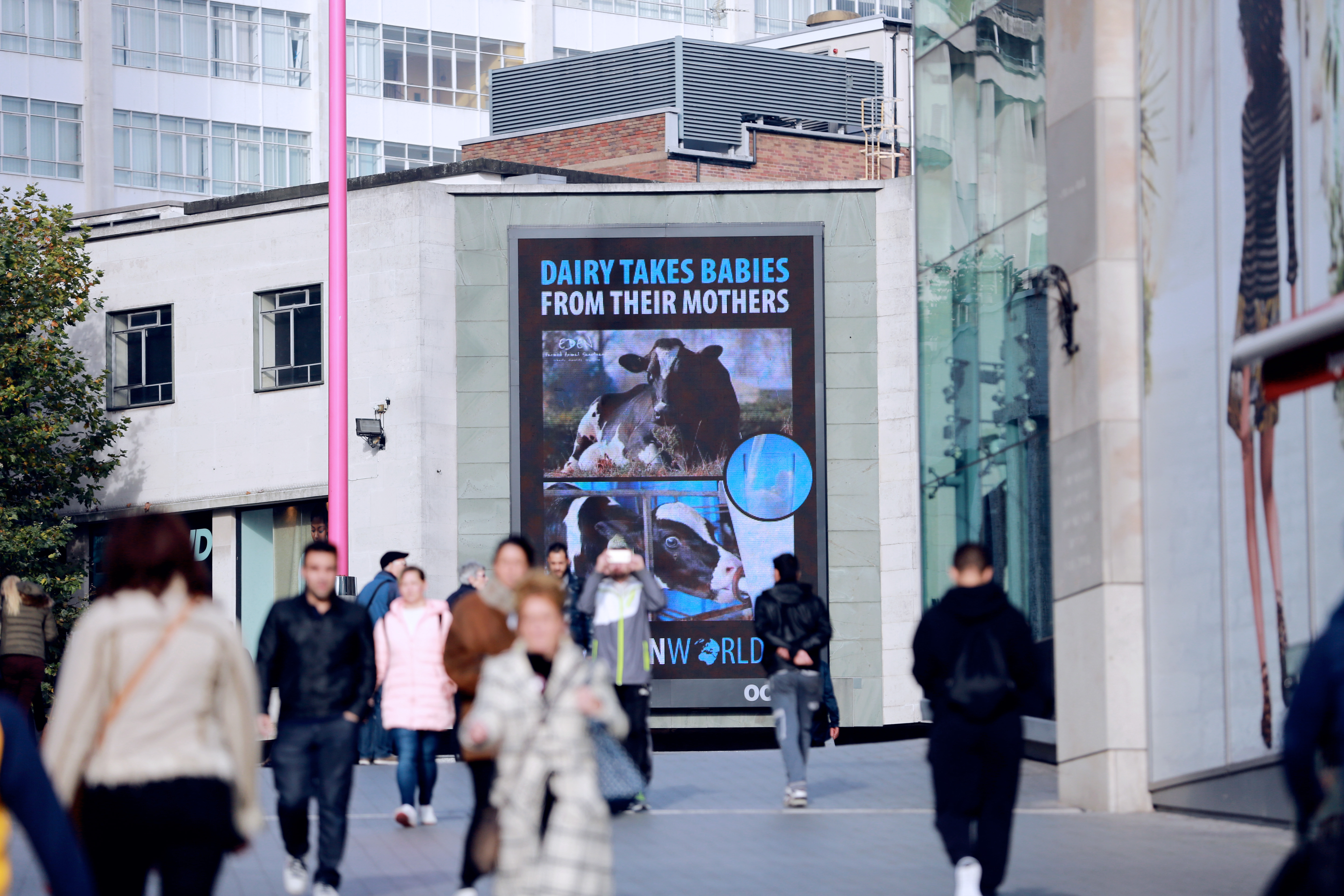
Although Go Vegan World is the largest vegan education campaign worldwide, it is a grassroots organisation firmly rooted in the lives of other animals. It is run by Eden Farm Animal Sanctuary Ireland which is home to more than 100 residents, all of whom are survivors of animal agriculture. They inspire and inform the campaign and their images feature in most of its advertisements.
The advertisements are designed to encourage empathy towards the animals we use for food, clothing, entertainment and research, as individual, feeling beings. When other animals are seen for who they are, and for the qualities they have in common with us, empathy with them becomes easier. We can then put ourselves in their positions, and comprehend what they endure when we are not vegan.
The advertisements cover several themes that counter traditional representations of animals as objects who exist to serve us, and willingly participate in their own exploitation, mutilation and death. They show the animals in a light that most people have not previously encountered: innocent, defenceless, trusting, affectionate beings who feel, and who do not want to die.
The advertisements are colourful and eye-catching, capturing the complex sentience of the animals depicted. This contrasts with their stark educational messages, reminding us of the price they pay for non-veganism.
The cow with a tear running down her face reminds us that Like Us, They Feel. The monkey behind bars in a zoo lets us know that the price she pays for our day’s entertainment is lifelong imprisonment. The frightened faces of the pigs at a slaughterhouse tell us that Humane Meat is a Myth. The innocent mouse reaching up to cling onto the hand of his vivisector shows us that They Trust Us, yet we torment them because we believe that our cosmetics, cleaning products and scientific research are more important than his life.
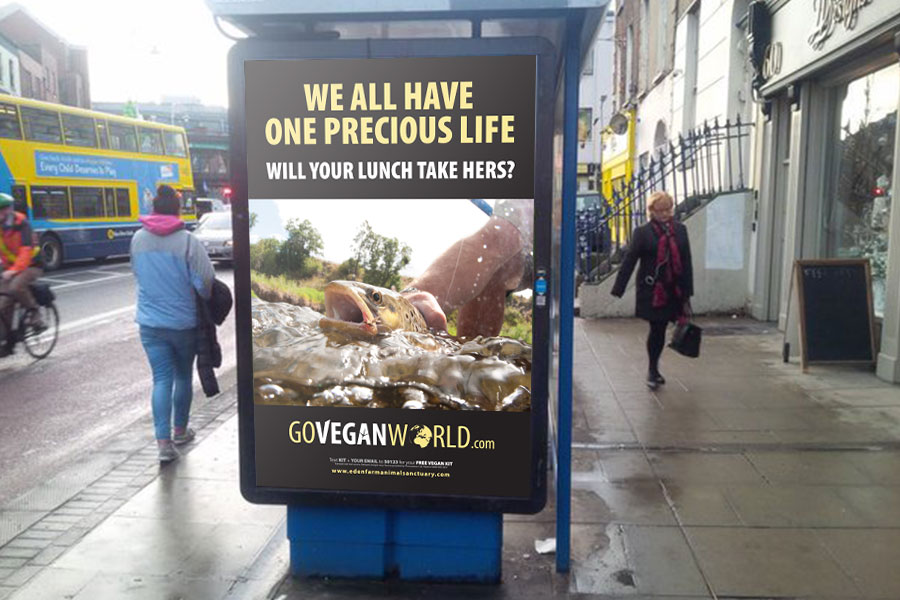
The contentment of the pig as she is caressed by a human hand is juxtaposed with her comrade’s body as it revolves over a barbecue, reminding us that They Trust Us, We Butcher Them. The fish being dragged by a fisherman from the river that was her home depicts the human abuse of power in a classic bullying scene, whilst the headline reads We All Have One Precious Life. Will Your Lunch Take Hers? The beautiful mother-child bond of the cow as she licks her newborn calf reminds us that Dairy Takes Babies from their Mothers. Feedback from the public informs us that these messages are sufficiently powerful to prompt people to research the website and go vegan.
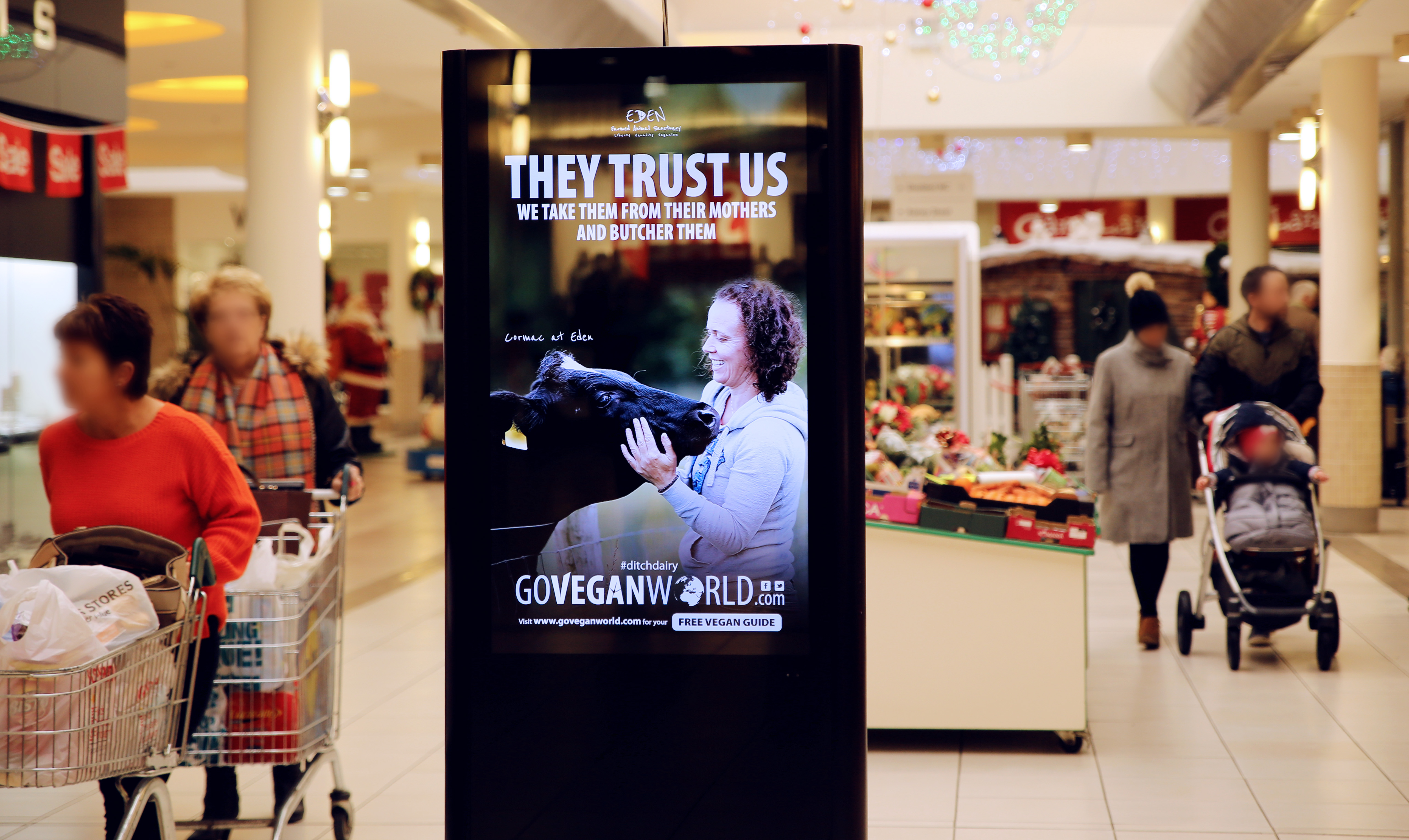
Go Vegan World is one of the few organisations focused on the animals it advocates on behalf of, giving an unmistakable message that the complete abolition of animal use is the only rational response to the problems other animals face at our human hands.
Unfortunately most campaigns emanating from the animal rights movement do not meet the needs of the oppressed animals they advocate for. In fact, one would be forgiven for imagining that veganism is a diet or a trend, or even a form of lifestyle consumerism, given the manner in which it is currently popularly portrayed. With typical humanocentricism, advocates assume the need to dilute the message to make it palatable to the public, presuming that they are unable to absorb the significance of a serious social justice issue, unless it is couched in a manner that prioritises human interests.
The word vegan has been bastardised by both the media and even by many advocates, often resulting in the complete obliteration of the animals it concerns. Veganism is the moral conviction that it is wrong to inflict unnecessary violence on others. It is not the end goal; it is merely the step that we need to take to begin restoring their rights. Veganism is not a fashionable, elitist, fad. It is a radically new way of recognising and relating to other animals with respect, one that humbles us as we grapple to reconcile the complexity of their sentience with the bluntness of our own.
In keeping with this definition of the word, Go Vegan World gives a clear message that other animals are not ours to use. Because the campaign is so deeply embedded in the individual histories and personalities of the animals at Eden Farmed Animal Sanctuary, it is both informed and powerful. For the first time in history the animals themselves have taken to the streets to show us who they are and to assert their right not to be used. The campaign message remains focused on the animals who are affected by our use of them. It does not distract from or compromise on what they need from us.
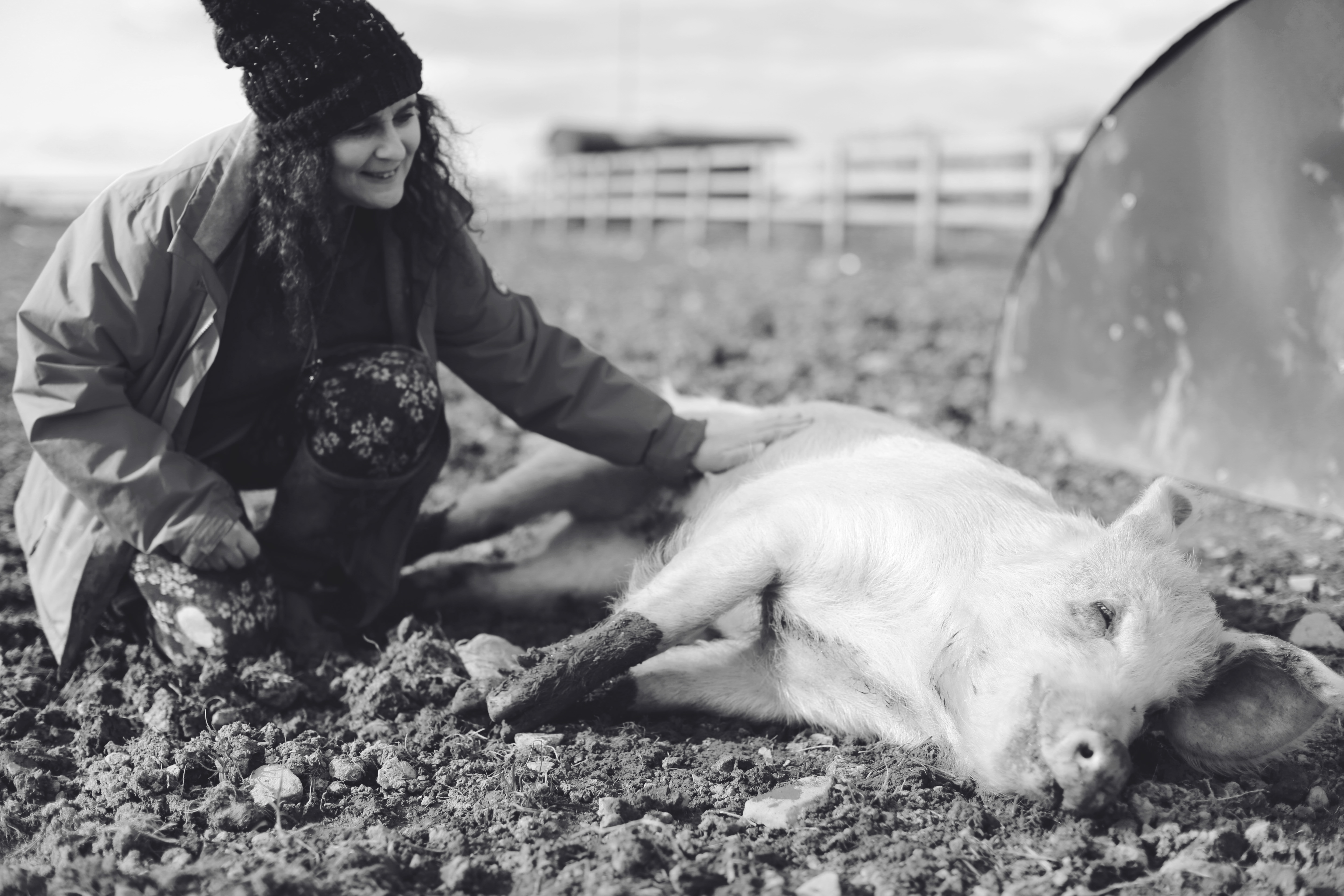
The integrity of the campaign was vindicated in 2017 by the UK Advertising Standards Authority finding in favour of the Go Vegan World claim that Humane Milk is a Myth. The dairy industry had claimed this was not fact-based, and that it misled consumers into believing that farmers did not adhere to welfare regulations in the production of dairy.
Go Vegan World clarified, however, that its aim was to show that the use of other animals is unjust regardless of adherence to welfare guidelines. The production of dairy, like every animal use, involves rights violations such as artificial insemination, separation of mother and calf, selective breeding and the consequential physiological stress of repeated cycles of pregnancy and simultaneous lactation.
There is no humane way to exploit the reproductive system of another being. There is no right way of separating a baby from his or her mother. There is no justification for taking away the purpose, existence and entirety of someone else’s life to meet a trivial human desire for profit. Taste or habit offers no excuse for killing.
It is because other animals are so unfairly and violently violated that people go vegan. This is quite distinct from going on a plant-based diet, or reducing animal use for health reasons, or because it is more environmentally and economically sustainable to do so. While these intersectional aspects of veganism are relevant, they do not constitute veganism and are neither necessary nor sufficient reasons for being vegan.
There is only one reason to be vegan and that is because we respect life and refuse to participate in unnecessary violence. This is the essence of the Go Vegan World message and it is why it targets the root cause of animal use (speciesism), and why it promotes the complete abolition of animal use by humans.
This is also why Go Vegan World has consistently attracted the attention of the animal exploitation industries. A high profile campaign that is unwavering in its call for complete cessation of animal use is unprecedented, and it is of immeasurably greater concern to those who profit from non-veganism, than all the limp calls for better welfare of those we exploit, less meat consumption, or the public portrayal of veganism as a trendy lifestyle or diet.

Becoming vegan involves a dawning awareness that other animals share our capacity to feel; that our use of them is unjust because it harms them. It begins when we recognise that not only can they feel pain; they also feel pleasure and they value their lives.
Each of them, like us, has one precious life. When we are not vegan we take that one, and only, life from them, individual by individual, in their thousands throughout our lifetime. Every year seven billion humans kill over 70 billion land animals, and trillions of fishes. Veganism is made possible when we realise that animal use is unnecessary and that every one of them dies for something humans do not need.
Veganism begins in the cognitive processes of our altered perception of the world in light of this new information. Most of us are shaken to the core when we scratch the surface of the horror of animal use. The world we imagined to be relatively safe, benign, and trustworthy is revealed as carefully organised to profit from torture and death, the brutal intricacies of which are legislated for, and sold to us as if they are both necessary and humane.
We go vegan when we realise we have been sold a monstrous lie. Few of us would willingly participate in the extreme violence that is inherent in every non-vegan item and choice we make, if we were in possession of the information the Go Vegan World campaign is bringing to light.
Go Vegan World is designed to target the processes upon which behavioural change are predicated. The advertisements along with the website and vegan guide, provide information that prompts the cognitive and emotional processes that motivate people to research veganism. These processes completely alter who we perceive ourselves to be; how we view the world and our place in it; and, concomitantly, how we behave in light of the awareness of the consequences of our actions on others. This is why veganism is not a lifestyle that we can adopt and reject as it suits us. It is who we are.
In our time where there are ample alternatives, we are either mindlessly or deliberately violent depending on whether or not we are aware of the facts, or we are vegan. The aim of Go Vegan World is to make as many people as possible aware of a violence that is generally hidden, and to remind them of who they exploit and kill, so that they chose to be vegan.
Many will read this in agreement that veganism is the right thing to do and vaguely plan to be vegan at some distant and perfect future moment. But it is your responsibility to be vegan now.
The animals we use feel as we do. While we wait for that perfect moment to live in alignment with the basic moral premise that it is wrong to harm and kill, they are being born exquisitely vulnerable and new to this world, with a death sentence on their young heads. Newly emerged from their mothers’ wombs, they instinctively reach for the nurturing safety of her breast, only to be heartlessly taken from her so we can take the milk she produces to feed them.
While we wait they are being confined, mutilated and tortured on farms, in laboratories, in circuses and zoos.
While we wait they are taken to slaughterhouses where they are hung by one leg that bears the weight of their whole, frequently artificially obese, body. Some of them are still conscious when their skins are removed or when they are dropped into tanks of boiling water. All of them are alive when their throats are slit. All male chicks are conscious when they are minced or gassed.
We do not have the right to do this.
Their lives and their bodies are not ours to use.
There is nothing special about being vegan. To stop participating in this violence that we ourselves would dread, is merely the decent thing to do. We owe it to them to be vegan.
The Compassion Foundation of Ireland
Go Vegan World

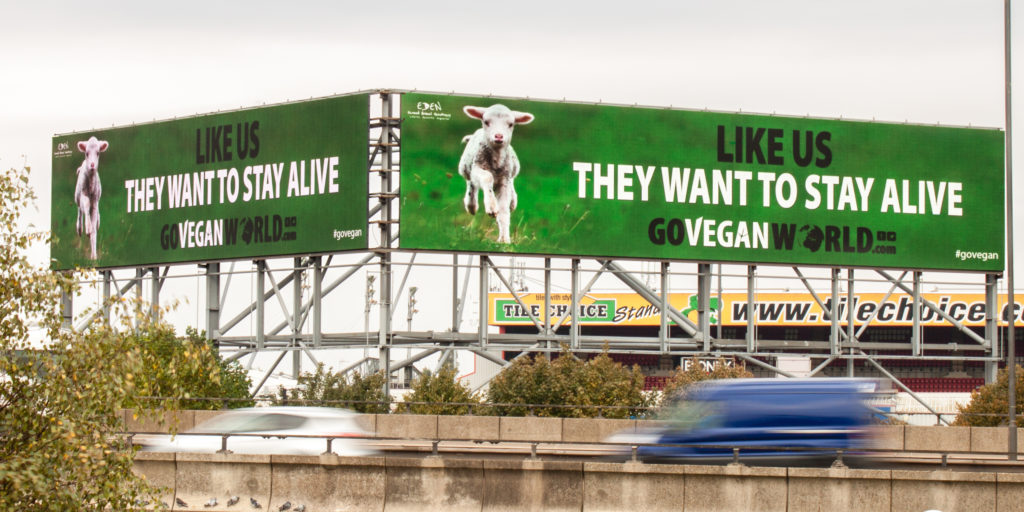


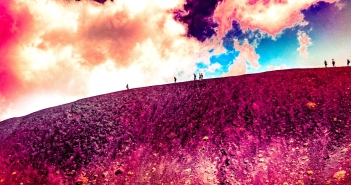
2 Comments
I would like to get some banners like that up in our nearest city. How would we go about it?
Hello Becky, thank you for your query. Can you please email us at [email protected] to discuss it further. Thank you.